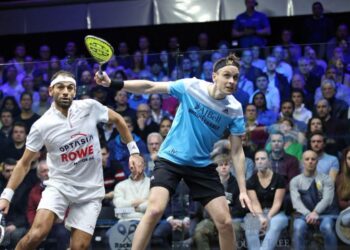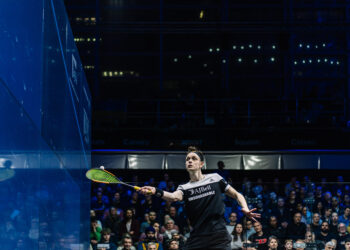Borja Golan has revealed that he will dedicate the next phase of his career to helping up-and-coming squash players at his new academy.
Spain’s greatest ever player officially announced his retirement from the PSA World tour last week, aged 40.
Talking to Squash IQ, the former world number 5 opened up on his goal of boosting Spanish squash, how he succeeded in playing better squash aged 39 than aged 30, and how the tour has changed since he joined the fray in 2006.
Spurring on the next generation
Considering ‘El Toro’s obvious passion for the game, it’s little surprise that the Santiago de Compostela-based player has chosen to follow in the footsteps of the likes of Nick Matthew and Gregory Gaultier and stay in squash post retirement.

While Matthew runs an academy for around 60 juniors and Gaultier is working with elite players such as Nour El Sherbini and Mohamed Elshorbagy, Golan is driven by a desire to right a wrong from his early career.
He now runs an academy 5km outside his home city housing a stable of 15-20 players. This includes Spain’s respective world numbers 50 and 290 Bernat Jaume and Pascal Gómez , as well as Argentina’s former world number 73 Robertino Pezzota. It also hosts visiting players, including currently Chile’s Lucas Perez and Columbia’s Maria Tovar.
“When I was a young player in Santiago, I didn’t have a structure here,” Golan said, explaining the rationale for the Golan Squash Academy – which strives to give up-and-coming players access to top-class medical care, physios, sports psychologists, physical trainers and squash coaches.
“If I got an injury I had to call a friend to see if they knew a doctor or a physio. I needed favours because a pro player cannot wait three weeks if they get injured.
“And most of the time I was training with one or two other players who were a lower level – and there was no physical coach.
“I wanted to put a structure in place for players who want to improve. They don’t need to worry about anything other than giving 100 per cent on court.
“We built the academy with that in mind.
“It’s all the things I didn’t have in my daily routine.”

Squash in Santiago
Offering its players access to four squash courts, as well as the spa, padel courts and range of other facilities at the Squash Club Santiago, Golan’s academy currently hosts around 12-15 senior player, as well as 5-6 juniors (including Spanish under-13 champion Lucas Castillo).
His decision to stay in Spain flies in the face of a trend that has seen many top pros head to the US to coach post retirement.
“After travelling for so many years, it’s nice to be at home,” Golan said.
“America has many coaches and don’t need any more. I think I can help Spain improve at squash as a country. I can probably do a better job here and I’m happy to do it here.”
Knee niggle
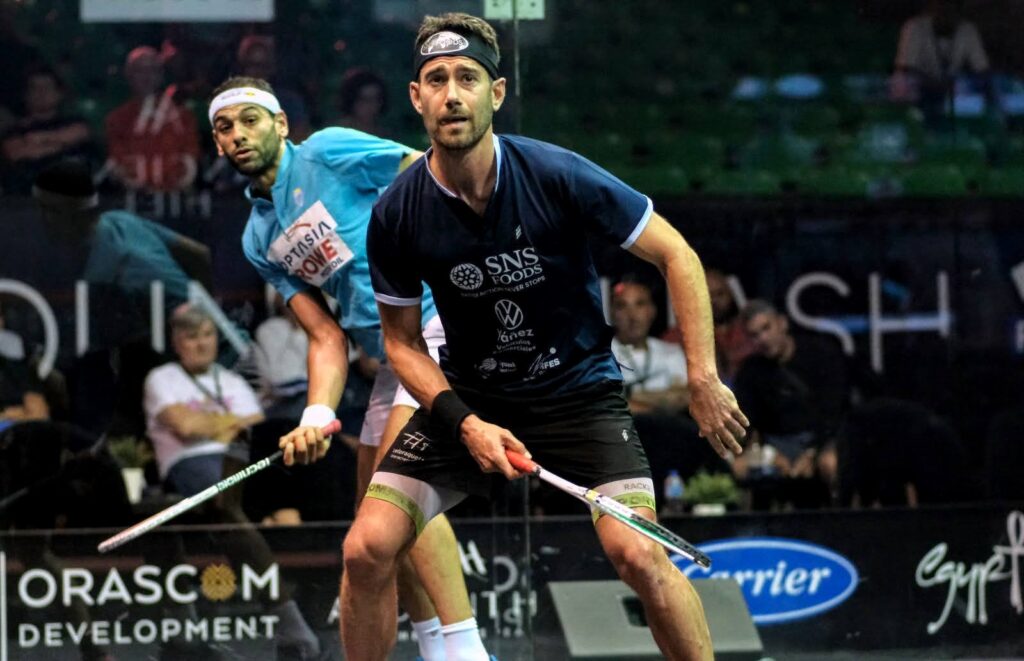
Although Golan is now helping to bolster the careers of the next generation of pros, it took him several months to come to terms with the fact that his own was over.
The Spaniard had intended to play on until June 2023 before a knee niggle sustained in December forced a rethink ahead of his 40th birthday (in January 2023).
“I was a little bit down,” he confessed.
“I decided [to retire] mid January. For two months I wasn’t the best mentally. I love the sport and the competition so much, that’s why I played as long as I did. So it was very hard. I didn’t want to think or write anything about it then, but I feel much better now.
“Once you know it’s over, there’s a bit of sadness there. It’s tough if you love it.”
Golan had, however, been playing injury free for the final two years of his long career, beating a number of top players including Miguel Rodriguez and Mohamed ElSherbini in 2022 and reaching the last 16 of El Gouna (where he was defeated by Mohamed Elshorbagy – pictured above).
“I finished playing great squash from January to November, and had no injuries. It was good to finish like that, so I have no complaints,” he said.
Formula for thriving into late 30s
With the 39-year-old James Willstrop running Elshorbagy close at the Canary Wharf Classic in March, and Joelle King, Tarek Momen and Rodriguez ranked inside the top 5, 10 and 15 at the ages of 34, 35 and 37, respectively, squash pros are increasingly enjoying high-level success for longer.
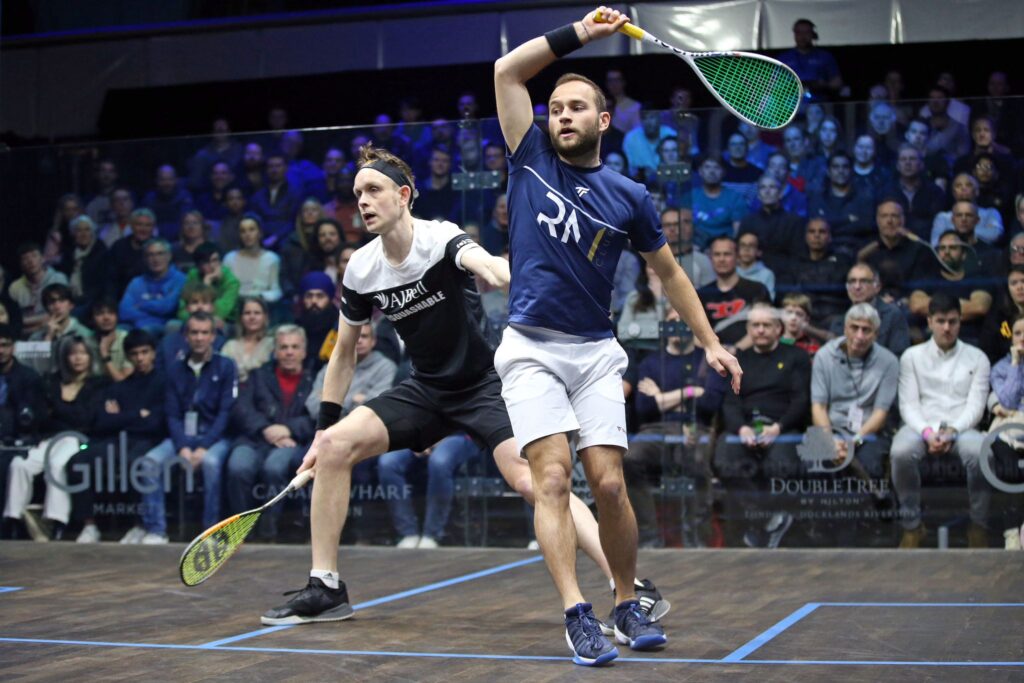
So what was Golan’s formula for mixing it on the tour as a 39-year-old?
“You have to change a few things when you’re getting older, but the main thing for me was to still love the game so much and be motivated for the tournaments. That’s the key to playing until 40,” he said.
“You have to be hungry. You have to love training every day. You have to love the game – feeling this fire inside to go on court and try to win each time you’re playing.”
Golan cut his training sessions to just one a day in the last two years of his career, and – even more importantly – completely retooled his game.
‘I played better squash at 39, than at 30’
Known initially as an attritional player, Golan ended his career using height, slowing play and attacking more frequently with drop shots and boasts.

“I probably didn’t play even one lob in a whole match when I was 23 or 24,” Golan said.
“I was a very physical player who used fitness to tire opponents.
“In the middle of my career, when I started to play more on glass courts, I played more attacking shots and used my speed not only to counter attack but to attack.
“And then in the last part of my career I realised I cannot win matches playing at a fast pace, so I started to lob more. Of course, if you play the lob all the time you’re not dangerous, but if you mix the pace it works well.
“I probably played better squash when I was 39 than when I was 30, although of course my fitness levels were not as good as ten years before.
“I was so happy to play the last part of my career trying to beat top players. Even if I didn’t win I was still fighting and enjoyed it so much.”
Turning up the volume
Branded a ‘warrior’ by peer Daryl Selby, Golan was known for wearing his heart on his sleeve and was responsible for arguably the loudest on-court exclamation [‘Vamos!’] on the male tour.
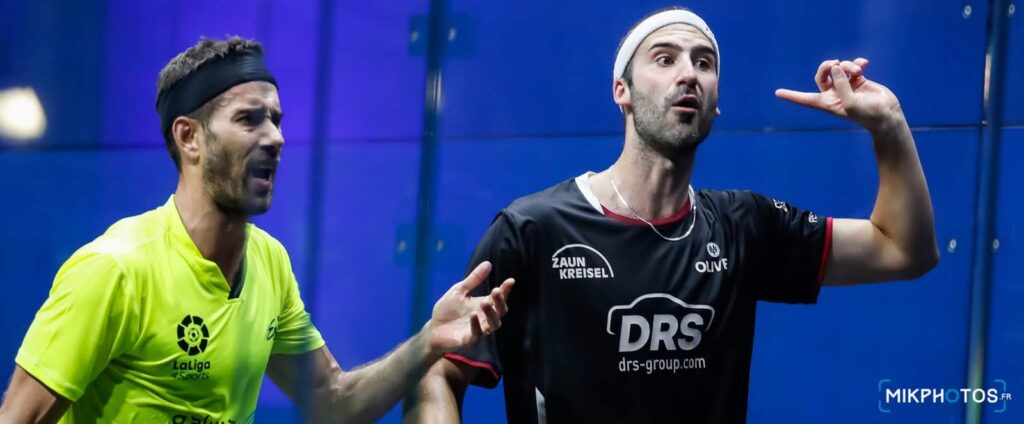
“When I was a bit younger it affected me more when a referee made a decision that I didn’t agree with,” he said.
“I’d scream so much I would lose focus for a few points. In the last part of my career I still screamed a lot but I think I concentrated better. Sometimes the screams came from inside, and sometimes they were good to motivate myself.”
“We are humans and are playing for many things on court,” Golan continued.
“We train hard to do well in tournaments and sometimes you aren’t happy with the decisions. Players show their disappointment differently, and sometimes I screamed.
“It’s tough when you’re 9-9 in the fourth game and two bad decisions can cost you the game. The referees have a very difficult job and I said in my letter that I apologise to them – they make mistakes but we also make mistakes.”
Borja Golan gives his verdict
Although Golan refused to be drawn on who he sees as his toughest ever opponent, he namechecked Jonathon Power, Peter Nicol (pictured below), John White, Amr Shabana, Ramy Ashour, Nick Matthew, Gregory Gaultier, Paul Coll and Diego Elias as among the greatest players he faced during a 17-year career.

With controversy swirling around the men’s game and concerns over the long-term health of squash (see here and here), does Golan feel that he leaves the sport in a better place than when he entered the fray?
“In my first year on tour, there were many players that were blocking so bad – and I don’t think it’s worse than that now,” he responded.
“You will always have a few players that take more space and who aren’t fair on court.
“In fact, in the 80s or 90s there were probably more fights on court, but there just weren’t always cameras to show it.
“They are big guys on court, and sometimes they are difficult to play around. But 95 per cent or more are very fair.
“I think the level of squash is great, and there are bigger tournaments each [year]. The product on TV is great. The women’s game has improved so much in the last few years, so I think the sport is very healthy at the moment.”

And the sport stands to be even healthier with Spain’s most successful player ever vowing to remain in its corner.
“I learned a lot as a squash player but I’m just starting as a coach and want to learn, which is a good sign,” Golan said.
“I’m happy to build [the academy] and work with people and try to help them. It’s the only way I can stay happy and motivated for the next part of my career.”


